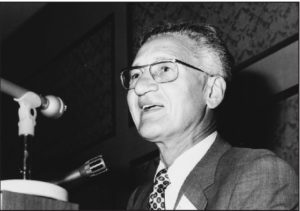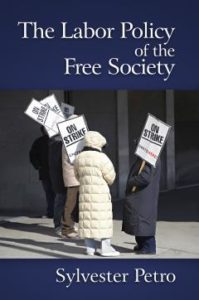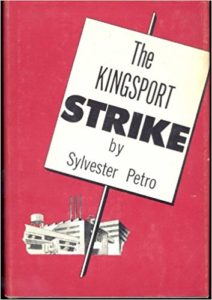Remembering Sylvester Petro

Readers may wonder why I have been focusing lately on retrospectives of legal scholars: Robert Bork (here and here), Lino Graglia, Bernard Siegan (here and here), and now Sylvester Petro. In candor, I have become sufficiently disenamored of the state of the legal academy that I prefer to reminisce about better times. I am reminded of some lyrics from Rodney Crowell’s song “Looking Forward to the Past”: This modern world is so out of order/I don’t know just how long it can last/But I’m looking forward to the past/I’m looking forward to the past.
Sylvester Petro was a major labor law scholar of the 20th century, but one that most readers have likely never heard of. He died, at age 90, on November 10, 2007, following a long career teaching labor law, antitrust, and contracts at New York University School of Law (1950-1972), Wake Forest University School of Law (1972-1978), and Baylor University. [1] Following his retirement from teaching, Petro served as Director of the now-defunct Institute for Law and Policy Analysis, conducting voluminous research into the judicial treatment of labor disputes prior to passage of the Norris-La Guardia Act in 1932. Petro was boldly and outspokenly opinionated, as a member of the Mont Pelerin Society, one of the founders of the Conservative Party of New York, and as an advocate associated with the Foundation for Economic Education (FEE), the National Right to Work Committee, and the Labor Policy Association, Inc. (for whom Petro authored a 1958 monograph entitled How the NLRB Repealed Taft-Hartley: The Destruction of Free Employee Choice). Fortunately, he left behind a rich body of scholarly and journalistic publications, which I shall describe shortly.
Why is Petro relatively unknown despite his prolific writing? Part of the explanation lies in academic politics; Petro was an unabashed libertarian, a proponent of Austrian School economics, and an unrelenting critic of the National Labor Relations Act (particularly as interpreted and enforced by the National Labor Relations Board). Petro believed that the ideal regulation of labor relations consisted of enforcing consensual contractual arrangements and prohibiting coercion and the use of force, in accordance with the common law. The NLRA squarely rejects this paradigm, substituting instead a regime of cartel-style “exclusive representation,” mandatory “collective bargaining,” significant impairment of employers’ contract and property rights, and legal privileges for certain union conduct.
Perhaps no area of law is so full of myths as labor law, and nobody was more committed to debunking those myths than Petro was. During Petro’s teaching career (1950-1978), such views–although popular in the business community–were decidedly out of the mainstream in legal academia. While Richard Epstein found greater acceptance for the libertarian point of view in the 1980s, along with the advent of the “law and economics” movement that validated application of free market principles to legal analysis, during the 1950s and 1960s Petro was unfashionably ahead of his time. Petro, out-of-style during the heyday of his career, was largely forgotten by an increasingly politicized professoriate after he retired. Later generations of labor law professors, at home with the premises of the NLRA, found it easier to ignore Petro than to respond to his withering critique. The current generation of progressive intellectuals ruling the academy scorns Petro as an “ideologically driven” scholar holding “radically anti-union views.”
Like many law professors of his era, Petro had an unusual pedigree. The son of immigrant parents, he was born in the South Side of Chicago in 1917 and, while working in the Windy City’s steel mills and machine shops during the 1930s, was personally involved in union activities as a member and organizer. He later attended the University of Chicago (A.B., 1942; J.D., 1945), and received his LL.M. from the University of Michigan in 1950. Prior to joining NYU, Petro practiced law in Chicago and edited Labor Law Reports for Commerce Clearing House (a major legal publisher in the pre-digital age). Petro’s experiences with the steelworkers union convinced him that “unions, whatever their capacity for good, had to be watched and subjected to the same laws and rules of conduct that apply to others.” [2]
A biographical profile in the 1958 monograph How the NLRB Repealed Taft-Hartley (with a Foreword by former Sen. Joseph H. Ball (R-MN), one of the principal authors of the 1947 Taft-Hartley Act) states that Petro had already written “more than seventy five articles on different aspects of labor law, … which have appeared in the Labor Law Journal, Michigan Law Review, the Notre Dame Lawyer, the New York University Law Review, and in newspapers and more popular journals.” Unfortunately, those articles were written in the pre-digital era and, due to copyrights and other issues, are generally not available online. Readers interested in Petro’s early work will have to visit a well-stocked law library and read the articles in hard copy.

Petro’s magnum opus, published in 1957 by the Ronald Press, was The Labor Policy of the Free Society, dedicated to noted Austrian economist Ludwig von Mises (who was then teaching at NYU) and University of Chicago law professor William Winslow Crosskey, whom he described as “the two most remarkable contemporary thinkers of my acquaintance.” (The book, although once out of print, is now available through the Mises Institute.) In it, Petro explains that “labor economics” is not a special field subject to different principles than the rest of the economy, and “labor relations” is not a unique category of human interaction that ought to be exempt from the legal rules developed over millennia of common law jurisprudence. As Petro states in his Preface:
[T]he common version of our labor law history casts the labor union in the role of the victim of enterprisers and their alleged servitors, the federal and state judiciaries. We hear repeatedly that for most of American history the working man committed a crime in joining a union; that the law discriminated against labor unions; that, until very recently, scarcely a strike could be called without having a court issue an injunction against it; that without unions the individual working man is a mere pawn and always treated as such by employers; that the courage of union officials is the only force which stands between workers and exploitation.
Some of these allegations of the current orthodoxy cannot be dealt with by resort to historical fact. That workers are absolutely dependent upon union representation; that only union leaders stand between workers and exploitation—these are theoretical, hypothetical arguments which cannot be either proved or disproved solely on the basis of fact or history. Since they are theoretical assertions, they can be dealt with only in terms of logic and theory. And so the first part of this book attempts to establish a set of standards against which arguments on the question may be judged in a more satisfactory way.
A straightforward account of the facts of our labor law history will suffice to dispel the factual inaccuracies in the remainder of these allegations. As we shall see in the following pages, there is little or no authority for the proposition that it was at any time illegal for workers to form and join unions. On the contrary, the best and most reliable authority has recognized the legal right to form unions for more than a hundred years. We shall see that, far from discriminating against unions, the law has struggled ineffectively—up to the very present—merely in the attempt to bring trade unions within the juridical structure, so that the same rules could be applied to them which apply to all other persons and entities in society. We shall see that the peaceful strike for higher wages or better working conditions has always been privileged in the United States; and that here, too, the legal situation has been exactly the opposite of what our history says it was. Unions have always had a specially privileged status. Finally, we shall see that, not unions, but nonunion men and employers have been denied adequate legal protection against coercion and violence. Correction of the historical record is one of the main objectives of the second part of this book, where an attempt is made to present as briefly as possible the major features of current labor law and policy in the United States in an accurate historical perspective.
The author shares the convictions that a free-market, private enterprise, private-property civilization is the best guarantor of the well-being of every man, including workingmen; that well run unions can help the operation of a free-market economy and in this way can add to the well-being of workers; that badly operated unions, while they cannot by themselves destroy the free market, may make it function poorly enough, or by ill-advised propaganda bring it into such disrepute as to provoke its gradual and unconscious abandonment, piece by piece.
Holding these convictions, the author urges the correction of the antisocial practices of trade unions. Fortunately this is a thing which can be done—it is a job for legal institutions already in being and for laws which are well understood. No great new administrative agencies, no complicated new codes, are necessary. It is necessary only to apply to unions, with adaptations made necessary by certain of their special characteristics, the same laws and legal institutions which apply to everyone else in a well-run, free society. Today, the progress of civilization requires that unions, with their capacity for good, be brought fully within the family of constructive, law-abiding citizens. The third part of this book offers proposals for a code of labor laws consistent with the goals and methods of a free and productive society.
The Labor Policy of the Free Society, although Petro’s masterwork, was not his only book. In 1961, he wrote an account of the long, bitter, and violent strike by the United Automobile Workers Union against the Kohler Company (1954-1960), at the time the longest major strike in American history. The book was titled The Kohler Strike: Union Violence and Administrative Law. The strike only ended when the NLRB ruled–contrary to the evidence–that Kohler had committed “unfair labor practices” and ordered the company to reinstate 1,700 workers. Petro’s chronicle of the events was a scathing indictment of misconduct by the UAW and administrative overreach by the NLRB. Petro concluded that “the NLRB conducted itself more in the manner of a kangaroo court than of a fair-minded legal tribunal.” Petro even recommended that the NLRB be abolished.

Petro wrote another book in 1967, The Kingsport Strike, regarding the long-running strike by a group of unions against the Kingsport Press, beginning in 1963. Unlike the Kohler strike, the Kingsport strike was a failure for the unions. The NLRB dismissed the unions’ unfair labor practice charges and the company successfully hired replacements for the striking employees. Four years after the strike began, the employees voted to de-certify the unions. Petro’s journalistic account focused on the human dynamics that led to the unions’ debacle, and the impact on the affected employees.
Following The Kingsport Strike, Petro focused on the background and constitutionality of the NLRA, beginning with a hard-hitting article in the Wayne Law Review entitled “Expertise, the NLRB, and the Constitution: Things Abused and Things Forgotten.” [3] In the decade of the 1970s, Petro followed up with a companion piece in the University of Toledo Law Review, entitled “Civil Liberty, Syndicalism, and the NLRA.” [4] In 1974, Petro took a critical look at the applicability of the private sector collective-bargaining model—which was explicitly predicated on a supposed Marxian inequality of bargaining power between capital and labor—to the rapidly-growing public sector workforce. Petro concluded that allowing government employees to engage in collective bargaining would undermine governmental sovereignty. [5]
Petro was a pioneer in opposing the application of NLRA concepts to public-sector labor relations, and even served as counsel for the dissenting employee in Abood v. Detroit Board of Education, 431 U.S. 209 (1977), arguing the case in the U.S. Supreme Court. It is fair to say that Petro anticipated all the problems and abuses that Abood created, which the Supreme Court has been forced to confront in a series of subsequent cases. Forty-one years later, many observers predict that the Court will finally overturn Abood in the Janus case this term. Once again, Petro was ahead of his time.
Later in the 1970s, Petro published a four-part series of lengthy, deeply-researched articles that refuted in detail the myth that, prior to the 1932 Norris-La Guardia Act and the 1935 Wagner Act (or NLRA), that state and federal courts improperly issued injunctions to restrain peaceful concerted action by employees. Petro demonstrated that courts, using common law principles, only enjoined violence, coercion, and violation of employers’ property rights. The first article appeared in the Wake Forest Law Review [6], and the last three appeared in the North Carolina Law Review. [7] Collectively, they discredit the conclusions reached by Felix Frankfurter and Nathan Greene in their influential 1930 book The Labor Injunction. No wonder labor law scholars prefer to ignore Petro.
In addition to his scholarly writings, Petro wrote numerous essays for publications such as The Freeman, Barron’s, and Fortune. Petro’s scholarship will appeal to libertarians, classical liberals, students of the common law, originalists who object to the Supreme Court’s New Deal-era caselaw, and readers with a free market or Austrian bent. Imagine Richard Epstein on steroids.
Unfortunately, I did not “discover” Sylvester Petro until after I graduated from law school in 1980. He is a giant in the field of labor law. Liberal critics fear that, in the pending Janus case, “more than a decade after his death, Sylvester Petro is poised to win his biggest argument.” If so, it is a victory that is richly deserved.
[1] Sylvester Petro, “A Strategy for the War of Ideas,” The Freeman (June 1979), at 323.
[2] Sylvester Petro, The Kingsport Strike (1967), back cover.
[3] 14 Wayne Law Review 1126 (1968).
[4] 5 U. Toledo Law Review 447 (1974).
[5] See Sylvester Petro, “Sovereignty and Compulsory Public-Sector Bargaining,” 10 Wake Forest Law Review 25 (1974).
[6] 14 Wake Forest Law Review 341 (1978).
[7] 59 North Carolina Law Review 99 (1981); 59 North Carolina Law Review 867 (1981); 60 North Carolina Law Review 543 (1982).































